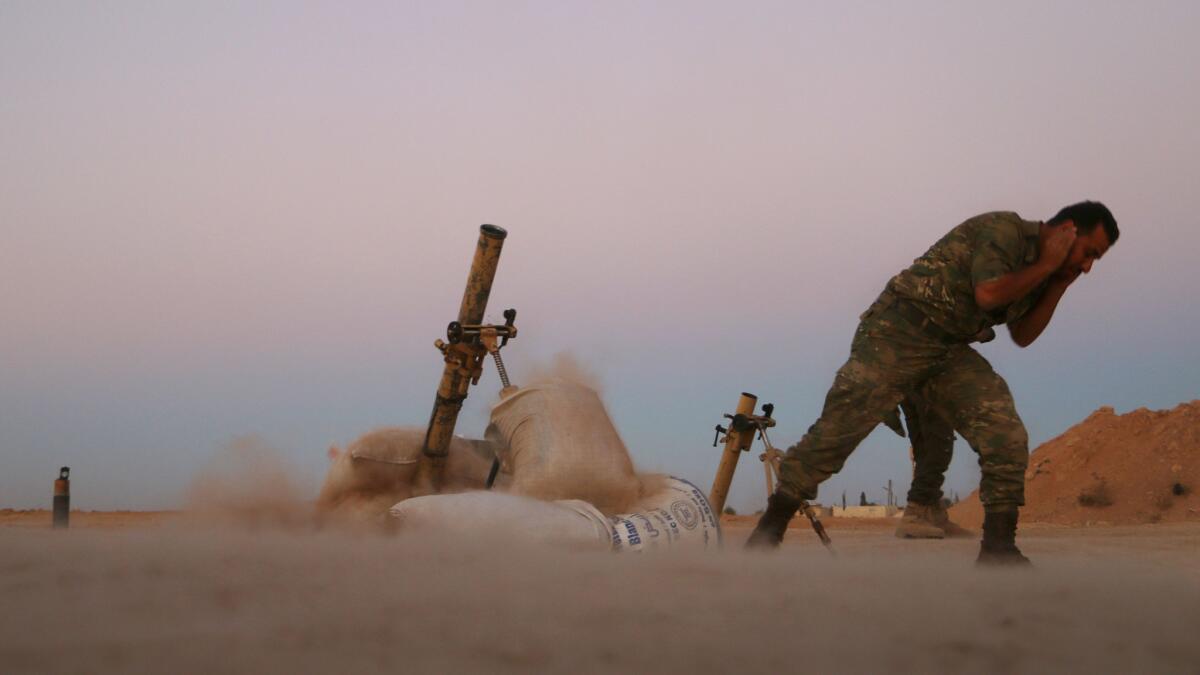Syrian rebels deal symbolic blow to Islamic State

Reporting from Amman, Jordan — As a place to visit, Dabiq, a northern Syrian backwater once home to 3,000 people would hardly deserve mentioning in guidebooks — but Islamic State believes it will be the site of a doomsday battle between jihadists and their Western enemies.
So when Turkish-backed Syrian rebels took the northern Syrian town on Sunday, they dealt a symbolic blow to the extremist group.
Dabiq figured heavily in the propaganda of Islamic State, which believed its jihadists would fight — and defeat — the Christian armies of the west on the land of Dabiq, marking the beginning of Armageddon.
Islamic State would often end its videos with a clip of one of its jihadists walking with a black banner hoisted above him as the voice of Abu Musab Zarqawi, the Jordanian-born militant considered the group’s spiritual father, says that while the “spark” of the caliphate was lighted in Iraq, “its heat will continue to intensify... until it burns the Crusader armies in Dabiq.”
The group also named its English-language online magazine after the town. “Jihadi John,” a British Islamic State recruit whose real name was Mohammed Emwazi, staged the beheading of American aid worker Abdul-Rahman Kassig there.
Syrian opposition fighters backed by Turkish special forces, artillery and jets seized control of the town and its surrounding villages Sunday, rebels and Turkish state media said, as part of a Turkish-backed campaign that was launched in August.
“We were able to go in with minimal losses. Daesh fighters withdrew and there was no resistance” said Ibrahim Zeir, a commander with the rebel group Fastaqim Kama Umert, contacted by phone Sunday. He referred to Islamic State by its Arabic acronym, considered a pejorative by the group’s supporters.
According to Zeir, seven rebels were killed and 10 others wounded during mine-defusing operations in Dabiq and three other areas taken Sunday.
He added that the jihadists had suffered many casualties in previous battles and no longer had the ability to confront the rebels.
“We would encircle them and they would run away before us like rats.”
Rebel groups and opposition-affiliated media uploaded videos of opposition fighters driving through the town, which is one of two prophesied sites of a doomsday battle between Muslims and their “Roman” enemies, according to a Hadith (or religious text) attributed to the prophet Muhammad. Some footage showed fighters firing Kalashnikovs into the air in celebration and singing songs mocking Islamic State.
Turkish Defense Minister Fikri Isik said Sunday that the operation was being carried out successfully in cooperation with rebels fighting under the banner of the Western-backed Free Syrian Army, according to a report by Anadolu, Turkey’s state-run news agency.
“We will fulfill whatever [the rebels] need,” he said, adding that Turkey had pushed back Islamic State from a 55-mile swath of land along the Syrian-Turkish border.
Turkish Foreign Minister Mevlut Cavusoglu said that, after the clearing of Dabiq, Turkish forces and allied rebels would head toward Al Bab, another Islamic State bastion, so as to “liberate … the area completely from Daesh terrorists,” Anadolu reported later Sunday.
The town’s loss comes as part of a larger setback for Islamic State, which in recent months has seen its self-proclaimed caliphate reduced to a fraction of its former size.
The group once occupied a third of both Iraq and Syria, but since the beginning of the year it has lost Palmyra and Manbij in Syria and Fallujah and Ramadi in Iraq. Iraqi forces are set to soon begin an operation to retake Mosul, Islamic State’s de facto capital in the country.
Faced with a military defeat and loss of territory, Islamic State commanders have downplayed the setbacks and counseled a change in tactics, exhorting their followers to return to the group’s origins as an insurgency that utilizes car bombs and assassinations to further its agenda until it can rise again.
They also downplayed the possibility of their defeat in Dabiq. This month, Al Naba, an Arabic-language publication of Islamic State, said that the coming fight for the town was “the small battle of Dabiq and not the great one.”
Abu Bakr Baghdadi, the head of Islamic State, insisted in an online message that “this was not the great battle of Dabiq we have been awaiting.”
Bulos is a special correspondent.
More to Read
Sign up for Essential California
The most important California stories and recommendations in your inbox every morning.
You may occasionally receive promotional content from the Los Angeles Times.










